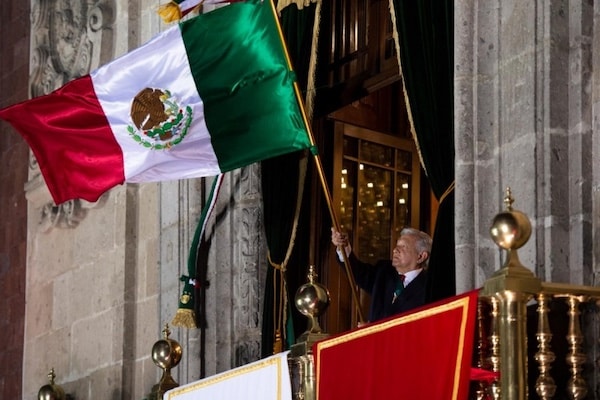In early February, Mexican President Andrés Manuel López Obrador (AMLO) proposed a package of 20 constitutional reforms. Though the entire package is unlikely to survive congressional pushback—AMLO’s MORENA party lacks a two-thirds supermajority—the proposed reforms represent the government’s latest attempt to reorient the Mexican economy away from neoliberalism, and toward a social democratic model that places more emphasis on national sovereignty and the interests of the majority.
According to Mexican law, presidents can only serve one six-year term, and AMLO is in the closing half of his final year. The reform package, which includes “measures to overhaul the judiciary, electoral law, pensions, and environmental regulations,” may be AMLO’s final effort to reform Mexican institutions under the banner of the “Fourth Transformation”—although poll numbers indicate it is likely MORENA candidate Claudia Sheinbaum will continue the transformation process after the June elections (according to AMLO, the first three transformations are the Independence of 1810; the Reform of 1861, which achieved the separation of church and state; and the revolution of 1910 that overthrew dictator Porfirio Díaz).
In the final years of his presidency, AMLO has faced opposition from Canada and the U.S., weathering legal challenges and diplomatic pressures from Ottawa and Washington over his efforts to increase the state’s role in his country’s energy and agriculture sectors. Likewise, Canada has vocally opposed AMLO’s measures to strengthen the Mexican state’s hand in mineral extraction.
Canadian companies have interests in 70 percent of all mining operations in Mexico. As such, Ottawa has been active in opposing AMLO’s progressive natural resource policies, which would grant property rights over the country’s energy and mining assets to all Mexican citizens. Canadian mining companies have regularly voiced their frustration with the Mexican leader, while Canada’s Trade Minister Mary Ng has frequently criticized measures that would limit the ability of Canadian companies to profit from Mexico’s resource wealth.
Canada’s opposition to AMLO’s reforms is unsurprising, given that Ottawa typically prioritizes access to Latin American resources over almost all other regional issues—including security, as the recent case of Ecuador shows. Still, Canada’s legal and diplomatic efforts to overturn AMLO’s reforms represent a shockingly anti-democratic attempt to stop Mexico’s widely popular government from enacting its mandate.
While the trade disputes have waned in recent months, AMLO’s new batch of reforms is already stoking the anger of the Canadian mining sector. One should expect Minister Ng to start voicing her “concern” soon.
In an article for CounterPunch, journalist Kent Paterson outlines the central pillars of AMLO’s reform package:
- Reaffirming the right of all Mexicans 65 or older to a pension with annual increases;
- Providing pensions that pay 100 percent of the last salary of retirees who are enrolled in the federal government’s IMSS and ISSTE systems;
- Assuring economic support for disabled persons and scholarships for low-income students;
- Guaranteeing that the increase in the minimum wage is never below the annual rate of inflation;
- Providing free health care to all Mexicans;
- Reducing the number of Congressional representatives and senators;
- Instituting guaranteed prices for farmers;
- Prohibiting GMO corn for human consumption;
- Banning fracking;
- Cutting Supreme Court terms from 15 to 12 years; and
- Electing judges by popular vote.
These reforms aim to deepen what may be AMLO’s greatest legacy in Mexico: “expanded pensions and other social programs benefiting the working class,” an economic redirection that is emerging “not only [as] a national consensus but as an institutional reality,” in Paterson’s words.
The proposed reforms also include an environmental component, namely a prohibition on concessions in water-scarce areas and a ban on new open-pit mines, which is especially relevant to Canadian mining.
The mining industry is already complaining that AMLO’s moves will “generate uncertainty and curtail investment”—code for “hurt our ability to profit.”
Vancouver-based Fortuna Silver Mines Inc., owner of a silver and gold mine in Oaxaca, has spoken out against AMLO’s environmental reforms. “It’s no secret that this administration has been averse to mining,” said the company’s President Jorge Ganoza. “If it were to continue, we would certainly see Mexico lose ground compared to other mining nations.” Meanwhile, Riyaz Dattu, an attorney who advises Canadian companies on arbitration, claims AMLO’s reforms “will drive investments away.”
Last year, Minister Ng criticized AMLO’s mining reforms, calling on Mexico to abandon its pursuit of resource sovereignty and instead “create opportunities for [Canadian] businesses.” Ng had previously “expressed concerns regarding the treatment of Canadian mining companies in Mexico” and claimed, without evidence, that Canadian mining companies are “leaders in establishing inclusive and sustainable workplace practices.”
While it remains to be seen if AMLO’s reform package will survive congressional opposition, its proposals are already defining the debate around the upcoming presidential election.
Should Sheinbaum succeed AMLO, she will have a definite mandate to see these reforms through.
In that case, one should expect Canada to continue its efforts to obstruct the Fourth Transformation and Mexico’s path to resource sovereignty.

